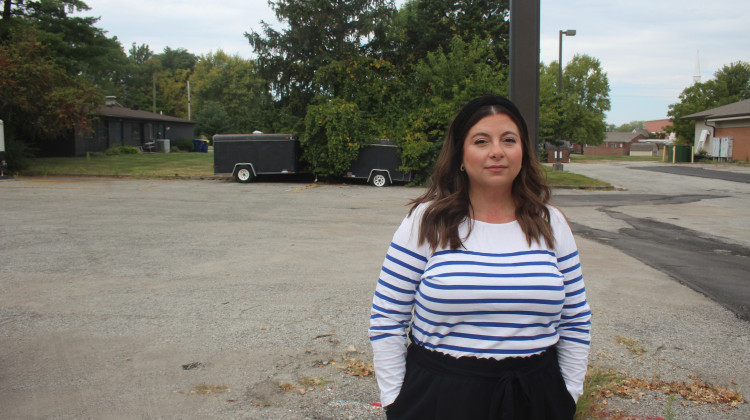The third wife of McDonald’s co-founder Ray Kroc inherited nearly $500 million when the burger magnate died in 1984, and willed around $3 billion upon her own passing in 2003.
Along the way, Joan Kroc’s generosity became legendary, lending her the sobriquet “Saint Joan of Arches.” You may even have heard her name on NPR and PBS as a benefactor of programming and wondered, “Who is this woman?”
The story of her astounding philanthropy is recounted by Lisa Napoli in her latest book, “Ray & Joan: The Man Who Made The McDonald’s Fortune And The Woman Who Gave It All Away.”
“I worked in public radio and heard her name all of the time,” Napoli said. “I went to cover a peace sculpture in disrepair. I asked, ‘Who paid for this?’ They said, ‘We think it was Joan Kroc.’ I wanted to know more about her, but couldn’t find a biography. I ended up writing one.”
Unselfish Generosity
During the five years it took to bring the book from concept to reality, one aspect of Kroc’s generosity fascinated Napoli the most.
“Just how she unselfishly reacted to news items and personal situations,” Napoli said. “Her husband was an alcoholic, but she turned it into a useful situation for others. She was a very involved philanthropist who didn’t just write checks.”
As one of her early projects after marrying Ray in 1969, she commandeered The Kroc Foundation and started Operation Cork, an education program for families of alcoholics, at their ranch in California. She was later a patron of the Betty Ford Clinic.
Her philanthropy really developed wings after Ray’s death. Though she had controlling interest in McDonald’s, she had no desire to run the burger chain. Instead, she made an art of spending the burger man’s money.
“By the time she married Ray, she wasn’t desperate for money, but she had been poor. She was caught between knowing she came from nothing and the mind-blowing idea she would never run out of money," Napoli said. “She had a sense of grandeur and splendor that wasn’t native to her, but she also had a sense of responsibility. Many people saw flood victims and wished they could help. She actually did.”
Anonymous Angel
In 1997, Kroc became aware of severe flooding in Grand Forks, North Dakota. She grew up in Minnesota and ran McDonald’s restaurants with her first husband in nearby South Dakota. Kroc wanted to do something, so she anonymously sent San Diego mayor Maureen O’Conner with a $15 million check to deliver to the mayor of Grand Forks. Three weeks later, Kroc flew out on her Gulfstream IV jet for a personal tour. Her cover was blown when a journalist tracked the tail number of her plane: N811JK. She didn’t do it for publicity; she just wanted to help.
The same was true in 1984 when Kroc, a San Diego resident, learned there had been a mass shooting at an area McDonald’s. She instructed her chauffeur to drive her to the restaurant in her light blue Rolls-Royce to see the scene herself. The tragedy was unbearable, but Kroc visited the wife and daughters of the deceased gunman. When she established a victims’ fund with $100,000, followed by $1 million from McDonald’s, she made clear it would also benefit the gunman’s family because they too were suffering.
Two years later, Kroc moved from guns to peace. A friendship with Rev. Theodore M. Hesburgh at the University of Notre Dame led to Kroc’s $6 million gift establishing The Kroc Institute for International Peace Studies. It seeks “a world free from the threat of nuclear holocaust.” It also serves as a beacon for civil and human rights in addition to offering undergraduate, master’s, and Ph.D. degrees in peace studies.
Conspiring With Salvation Army
Joan Kroc was just getting warmed up. During a tour of San Diego’s poorer areas with Mayor O’Conner, she came face-to-face with underprivileged kids and decided she wanted to give them a safe place to play after school. She reached out to the local Salvation Army.
She said, “Think big. Bigger than you’ve thought before.”
Kroc made an $80 million pledge for the Ray & Joan Kroc Corps Community Center that contains an Olympic sized swimming pool, ice rink, and concert hall. She personally drove the backhoe that turned the first shovel of dirt and hired Tony Bennett to perform at the center’s opening. A video of her on YouTube at the center’s announcement shows her deep love for children and a kindness that is beyond tears.

Despite her close relationship with the Salvation Army, she didn't always agree with the organization. One story recounts how Kroc purchased a $100,000 Bosendorfer grand piano, similar to the one in her living room, for the Kroc Center’s auditorium. Unfortunately, the Salvation Army would not allow the Gay Men’s Chorus of San Diego to perform there. Her reaction was classic Joan: She bought a second Bosendorfer and sent it to the chorus for their rehearsal space.
Kroc was not particularly religious herself and had funded Elizabeth Taylor’s efforts to curb AIDS.
“She was pan-theistic,” Napoli said. “She seemed intrigued by people who were devoted, no matter the devotion. She had people at Salvation Army who she trusted. She summoned them when she had the idea of the first center in San Diego because she felt they could be trusted with the money.”
“But, that is the paradox,” Napoli continued. “Most people don’t think of the Salvation Army as a religious organization. It’s not clear to me how much she thought of religion. Because of her relatively quick demise, it seemed logical. Though the center’s theatre doubles as a church, she didn’t intend to build a church – we’ll never know how she would feel about it.”
Enduring Legacy
In 2003, Kroc was diagnosed with brain cancer. How to dispose of nearly $3 billion gained imminent importance. Instead of granting it to a foundation for perpetual grants, she chose to leave it all to organizations that aligned with her passions. She gave $225 million to NPR, $60 million to Ronald McDonald House Charities, $50 million to the Kroc Institute at Notre Dame, and…$1.5 billion to Salvation Army for what now totals 26 centers and counting.
One of those is the 110,000 square-foot Kroc Center in South Bend, Indiana that includes sports, swim lessons, music lessons, camps, and “Kroc Church.” Its mission is to “stimulate the mind, body and spirit, to provide hope, and to transform the life of each and every member of the community.” It was constructed with $70 million from Kroc’s donation and $10 million raised locally. Doors opened in January 2012.
“She had a really tough childhood and wanted to do what she could within her purview to keep other kids from suffering,” Napoli said. “With her money, she could give kids a chance she didn’t get. Though, as a child, she did play music and ice skate. She believed kids are the future.”
None of this would have been possible without Ray Kroc and his genius in franchising McDonald's.
“There was something about him that matched her zeal for a bigger life,” Napoli said. “He had this ambition and hope for himself. It wasn’t necessarily financial. She wanted more than a regular life – to live in a bigger world.”
In the end, Joan Kroc’s legacy has a poignant lesson.
“Simple: Give,” Napoli said. “Giving is a crucial part of being alive. Even if you’re not wealthy, live and give large, embracing everything around you. What joy it clearly brought her; she got to see people enjoying it. I love how her story forces us to the fact that, yeah, you may not like fast food, but she happened to take the proceeds of it and did something remarkable.”
 DONATE
DONATE





















 View More Articles
View More Articles


 Support WFYI. We can't do it without you.
Support WFYI. We can't do it without you.